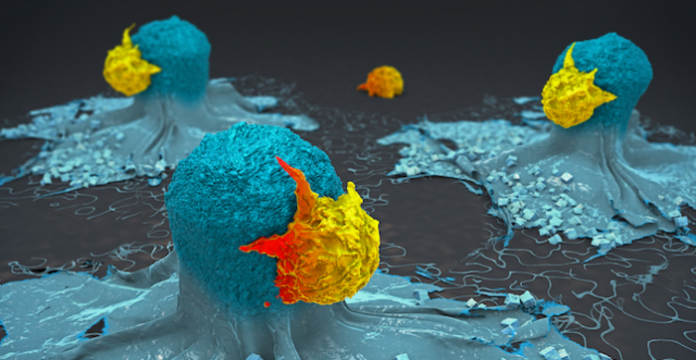
The first machine learning-based tool that can predict immune checkpoint inhibitor (ICI) response using routine clinical data such as complete blood counts and metabolic profiles has been developed. The SCORPIO model was validated using data from 9,745 patients across 21 cancer types treated with ICIs from Memorial Sloan Kettering Cancer Center (MSKCC), Mount Sinai Health System (MSHS), and 10 global Phase III clinical trials.
The paper appeared in Nature Medicine and the lead author is Seong-Keun Yoo, PhD, a postdoctoral fellow at the Icahn School of Medicine at Mount Sinai. Diego Chowell, PhD, assistant professor of immunology and immunotherapy, oncological sciences, and artificial intelligence and human health, Icahn School of Medicine at Mount Sinai, is the senior author.
Predicting a cancer patient’s response to ICIs without using expensive genomics or immune system analysis is a key clinical need. Many patients go on these pricey drugs but have no response after a lengthy treatment.
The Mount Sinai researchers say that not only does SCORPIO rely on widely available and affordable routine blood tests, but it also consistently outperforms existing FDA-approved biomarkers, such as tumor mutational burden (TMB) and PD-L1 immunostaining, in predicting patient responses to ICIs—thus setting a new benchmark for precision oncology tools.
“Immune checkpoint inhibitors are a promising cancer treatment, but they don’t work for everyone,” Chowell said. “Right now, doctors use expensive tests, like genetic or immune system analysis, to try to predict which patients will benefit. These tests can be costly, time-consuming, inaccurate, and not always available in every hospital. SCORPIO changes that by using routine blood tests that doctors already use to monitor their patients. This makes predicting treatment success faster, simpler, more accurate, and more affordable.”
Immune checkpoint inhibitor drugs have gained popularity in oncology because they boost the immune response against cancer cells. In the United States alone, spending on ICIs increased from $2.8 million to $4.1 billion and utilization increased from 94 to 462,049 prescriptions between 2011 and 2021, according to the Centers for Medicare and Medicaid Services.
In head-to-head comparisons, SCORPIO demonstrated superior predictive power compared to FDA-approved biomarkers, providing a more accurate and accessible solution for oncologists.
“We are excited about the potential of this technology to democratize access to personalized cancer treatment, making cancer care more efficient, affordable, and equitable for patients,” Chowell said. “SCORPIO’s simplicity and affordability make it a game changer in oncology. By using readily available clinical data, we can ensure that more patients, regardless of geographic or financial barriers, have access to precision cancer care. This tool could not only improve patient outcomes but also help minimize health care costs by eliminating the need for unnecessary treatments.”
“The next steps for this research are to collaborate with hospitals and cancer centers to prospectively validate the use of the model in various clinical environments and gather feedback to optimize the tool,” said co-senior author Luc Morris, MD, head and neck surgeon at MSK.
The team also aims to scale SCORPIO for global use, making it accessible in resource-limited settings to promote equitable access to personalized cancer care.
“Lastly, continuous algorithm improvements will enhance SCORPIO’s accuracy and predictive power, potentially extending its applications to other cancer treatments,” Chowell said. “Collectively, these steps could help establish SCORPIO as a vital tool in personalized oncology, enhancing patient outcomes and health care efficiency worldwide.”













